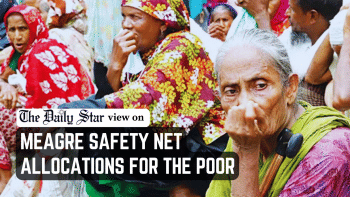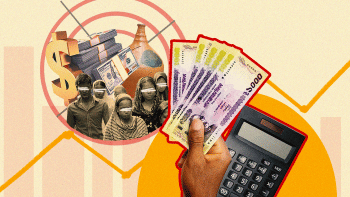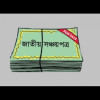Rethinking Bangladesh’s deficit financing

Financing budget deficits through domestic and external resources is widely practised in many countries, including Bangladesh, to manage fiscal shortfalls and invest in infrastructure to stimulate economic growth. For a large share of its budget deficit, the Bangladesh government primarily relies on two domestic sources: borrowing by issuing i) marketable securities and ii) non-marketable securities. Marketable securities include treasury bills and bonds, and non-marketable securities are largely comprised of National Savings Certificates (NSCs). While these instruments play a crucial role in deficit financing, there are concerns about how they are managed and their impact on macroeconomic stability and overall inequality.
Treasury bills and bonds are sold in open auctions participated by primary dealers on their own accounts and on behalf of clients which are mostly banks. This process is guided by market principles, where interest rates fluctuate based on demand and supply. When demand for government securities is high, the government typically pays lower interest rates. Conversely, when demand is low, the government's cost of borrowing increases. Sometimes, if there is insufficient appetite for treasury securities, the central bank intervenes, a practice known as "devolvement." However, this often leads to inflationary pressure, as money is printed without corresponding productive output.
In contrast, financing through non-marketable securities like NSCs presents a different set of challenges. NSCs are sold to individuals at fixed, government-administered interest rates, which are typically higher than market rates and add significant costs. For example, the government had to allocate Tk 11,217 crore for savings certificate interest assistance in FY24. Although NSCs provide individuals, irrespective of income status, with a stable savings instrument, it creates uncertainty for the government, which cannot accurately predict how much will be raised from these instruments in any given fiscal year, making fiscal borrowing uncertain.
The current governance and profit structure of NSCs also hinder efforts to achieve both macroeconomic stability and social equity. The amalgamation of NSC deposits, pure savings by individual citizens, within the Treasury Single Account (TSA)—a unified structure of government bank accounts maintained by Bangladesh Bank—diverges from TSA's function of consolidating government revenue streams and payments. Additionally, conflating interest payments on NSCs with social safety net expenditures complicates public financial management and obscures the true cost of delivering social protection. Moreover, the relatively high interest rates offered by NSCs disproportionately benefit middle- and upper-income individuals.
Volatility in NSC uptake directly impacts government expenditure, whether deposits exceed or fall short of demand. Higher deposits from NSCs result in excess liquidity and increased interest payments, while lower-than-expected deposits hinder budget implementation. Additionally, NSCs offer interest rates typically higher than those for government bonds and treasury bills, distorting the financial market and obstructing the development of a vibrant secondary market for treasury securities. These higher interest rates place a growing burden on public finances through rising interest payments. Most importantly, interest payments are made with little regard to the depositor's income level, leading to an uneven distribution of this facility across society.
Given these challenges, should Bangladesh consider abolishing NSCs to simplify its deficit financing strategy? The answer is far from straightforward. A key objective of NSCs is to promote savings. For many, NSCs offer essential social protection, providing a safe place to invest hard-earned savings and receive a predictable return. Thus, the government cannot simply eliminate them without risking significant harm to those who rely on this support.
According to the Bangladesh Bureau of Statistics (BBS), the per capita Gross National Income (GNI) in FY24 was Tk 306,144 in nominal term. The Household Income and Expenditure Survey (HIES) 2022 reported that the average household income and expenditure were Tk 32,422 and Tk 31,500, respectively, indicating that the households save only Tk 922 per month, or around Tk 11,000 per year, on average. Under the current NSC rules, individuals can invest up to Tk 15 lakhs and enjoy the highest interest rates. For investments exceeding Tk 15 lakhs, individuals receive slightly less interest than the previous ceiling, although it often remains higher than the market rate. This existing ceiling disproportionately benefits those who can afford to save more, while lower-income households—who can save much less—are left behind.
To address this issue, the NSC schemes can be redesigned. One proposed solution is to create a small savings fund with a separate account outside of TSA to avoid the amalgamation of government receipts and payments with individuals' savings. Also, a separate authority to manage NSCs can mobilise savings from low-income individuals by issuing small-denominated savings instruments considering low-income people's affordability. This authority will also act as a primary dealer and invest in treasury auctions like other primary dealers. This way the government can more accurately predict its borrowing needs for meeting fiscal deficit while maintaining a reliable savings tool for the low-income group, and it can reduce the distortion in the financial market.
One concern with the proposed model is that interest rates on NSCs could become market-based, potentially disadvantaging low-income savers. To mitigate this, the government could introduce targeted subsidies for small savers. Investors up to a certain limit, based on the country's median income, should receive the highest interest rate, supported by a government subsidy. This subsidy would be classified as a transfer in the government's budget, preserving the social safety net without distorting interest expenditure. This targeted approach would ensure that the savings scheme truly benefits low-income individuals.
Bangladesh's current approach to deficit financing, particularly through NSCs poses risks to macroeconomic stability and social equity. Restructuring NSCs by establishing a separate account outside of TSA and creating a dedicated authority with targeted subsidies would enable the government to continue encouraging savings and providing social protection. This would help reduce fiscal uncertainty and maintain proper public financial management. On top of this, the proposed reform will also address the inequality that the current system exacerbates.
Dr Md Rashedur Rahman Sardar is a member of Bangladesh Civil Service (BCS) and is currently working at the Ministry of Finance.
Views expressed in this article are the author's own.
Follow The Daily Star Opinion on Facebook for the latest opinions, commentaries and analyses by experts and professionals. To contribute your article or letter to The Daily Star Opinion, see our guidelines for submission.

 For all latest news, follow The Daily Star's Google News channel.
For all latest news, follow The Daily Star's Google News channel. 











Comments